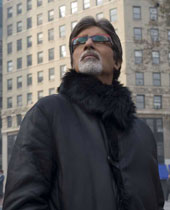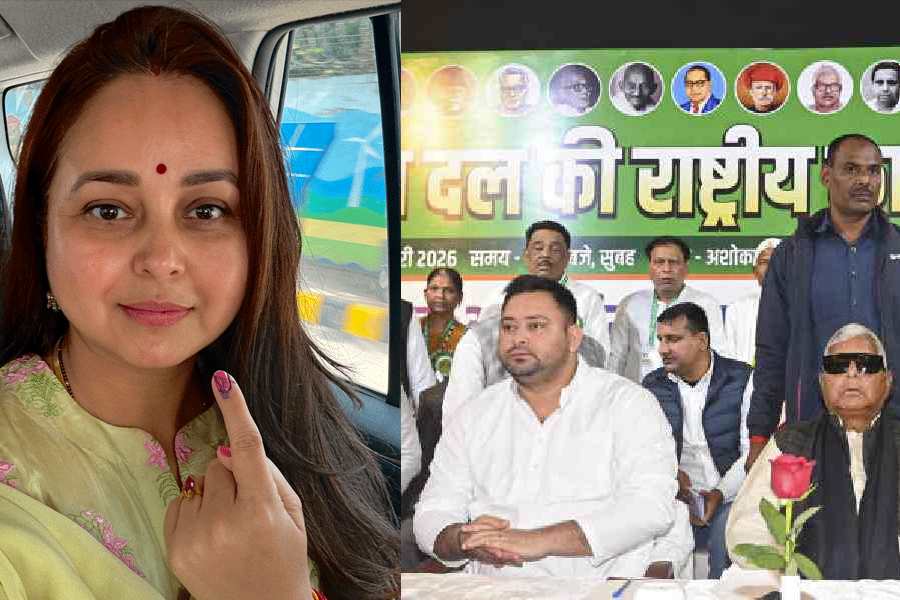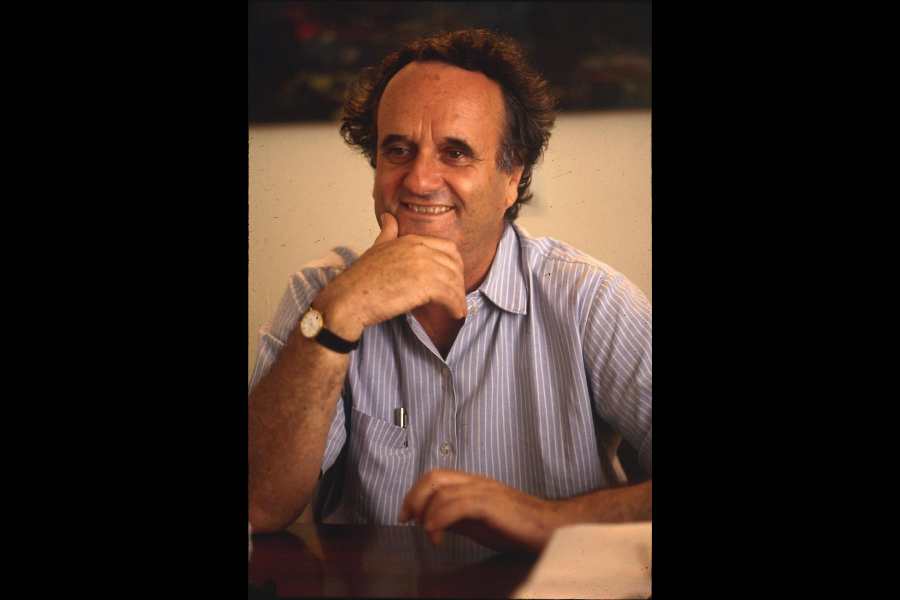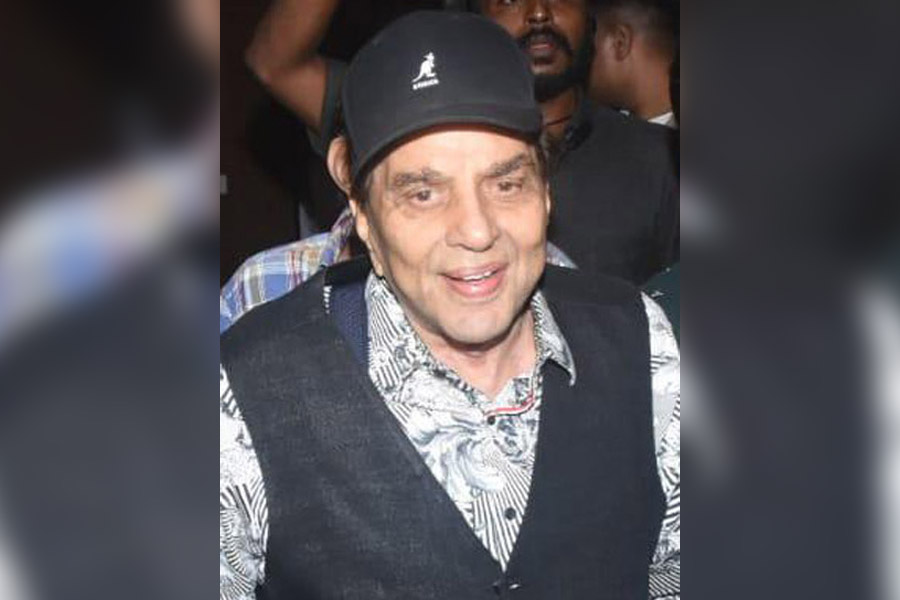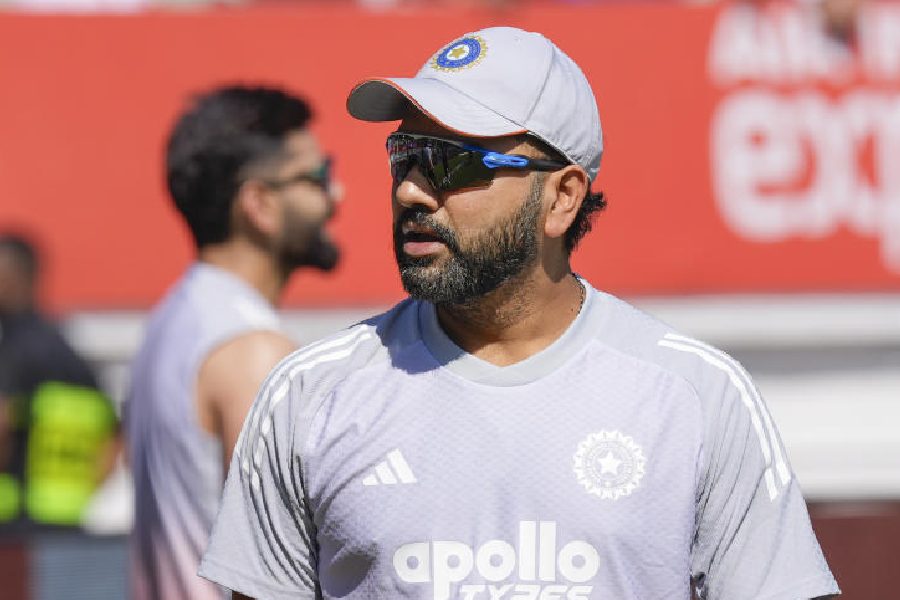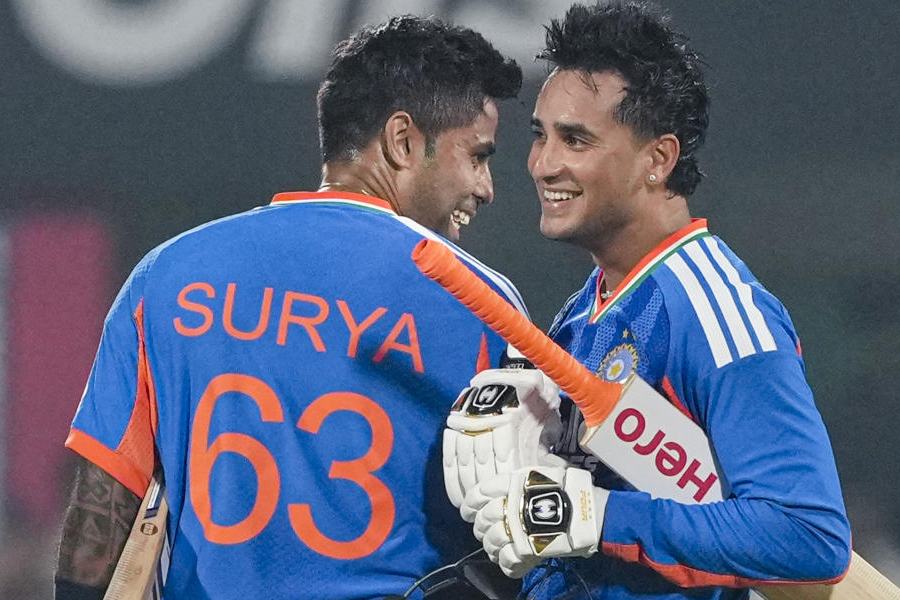 |
| TOWERING PRESENCE: Amitabh Bachchan in Kabhi Alvida Naa Kehna |
Age has a dazzling brand ambassador in Bollywood today. One who is pushing the Hindi film industry to junk the stereotypes and shift the goal posts when it comes to the depiction of old age. Sexy or funny, romantic or ruthless, majestic or forbidding — the aged protagonist has suddenly become a fascinatingly multi-dimensional subject that film makers can’t seem to get enough of. And it’s all happening because of one man — Amitabh Bachchan. The megastar who made his bones as the angry young man in the 1970s, is now the grizzled old man who is making Bollywood rethink its definitions of age.
Witness the current crop of films that features Bachchan. He plays a lovable old womaniser in Karan Johar’s Kabhi Alvida Naa Kehna; a 56-year-old married man smitten with a 18-year-old girl in Nishabd, which is Ram Gopal Varma’s take on Vladimir Nabokov’s Lolita and is yet to be released; and in Balakrishna’s Chini Kum, which is still in the making, he stars as a 64-year-old chef who romances a woman 30 years his junior.
Sexuality and old age? Now that’s nothing short of revolutionary in Hindi filmdom which has always gone by pretty definite rules about what it means to be three scores or more. The thundering patriarch (think Amrish Puri), the lachrymose father (think Kader Khan), the clownish paterfamilias (think Anupam Kher) — for years and years Bollywood has dished out these sexless caricatures of old age. So what prompted this bold adventurism? How is it that our film makers have suddenly found the will and the heart to attempt portrayals of men whose sexuality is undimmed in the autumn of their lives?
Industry insiders readily agree that if Hindi films are pushing the boundaries of storytelling and characterisation vis a vis age, it’s really because they want to cash in on the huge saleability of Amitabh Bachchan as a star. At 64, and at a time when most of his contemporaries have faded into oblivion, Bachchan continues to hold the audience in thrall. Which is why not just roles but entire movies are being written for him even today. Says Sunil Manchanda, producer of Chini Kum, “This film was written specifically with Mr Bachchan in mind. He is the kind of star whom the audience will go to see even if the story is offbeat. It’s his star power that gives creative people the impetus to think of unconventional stories around him.”
Indeed, in recent times, Bachchan has essayed many different sorts of roles that portray men of mature years. Whether it’s a tired, asthmatic cop (Khakee) or a villainous blackmailer (Aankhen), the extreme emotions of a man with a mission (Black) or the awesome reserve of an underworld don (Sarkar), whether it’s heartwarming romanticism (Baghban) or heartbreaking resolve (Viruddh) — Bachchan has played them all with characteristic finesse. And just when you thought he simply couldn’t get better, he has turned in yet another soaring performance. And film makers have fallen over themselves to cast him in yet another movie.
It’s not age they’re fascinated with, it’s Amitabh,” says lyricist and scriptwriter Javed Akhtar. No doubt. For barring the odd film like Saaransh (Anupam Kher) or Avtaar (Rajesh Khanna), character actors have always existed at the periphery of commercial Hindi movies. But with Bachchan it’s a different story. His old men are invariably pivotal to the movies in which they appear. “Even at this age, he can carry a film all on his own,” says industry analyst Komal Nahta. “Take Black, for instance. Though Rani Mukerji was exceptional in it, the film wouldn’t have been the commercial success it was had it not been for the presence of Bachchan.” Adds Bhawana Somaaya, editor of Screen and the author of the book Amitabh Bachchan: The Legend, “Films such as Sarkar, Waqt, Black, Bunty aur Babli, etc, would have been unimaginable without him. Film makers would not have dreamed of experimenting with different kinds of stories with him had he been a lesser actor. Undoubtedly, it’s his charisma and sex appeal that has made the aged protagonist so very attractive.”
Today, Bachchan charges Rs 2.5 crore to Rs 3 crore per film. (Shah Rukh Khan, the top earner, gets a cool Rs 6 crore per film.) Yet film makers and producers are more than willing to get him on board with that kind of money because, as Nahta points out, “it makes a lot of commercial sense to do a film with Bachchan”. Most of his recent movies, including Sarkar, Waqt, Bunty aur Babli, Black — not to mention Baghban, which was a superhit — have made handsome profits. He has had a few misses too, including Viruddh, Aankhen, Boom, etc.
But hits or misses, Bachchan’s stock with film makers just keeps on rising. In fact, industry insiders say that for most young directors, making a film with Amitabh Bachchan is the ultimate high. Hence the raft of roles being written to suit his age. Says Karan Johar, who has directed him in Kabhi Khushi Kabhi Gham (K3G) and now, in Kabhi Alvida Naa Kehna (KANK), “When I wrote K3G, I went and narrated the story to Amitji. I was sure that if he refused the film, I would drop the idea of making it. Thankfully, he agreed to do it.” Johar also waited for Bachchan to recuperate from his illness earlier this year so he could shoot the song Rock and Roll Soniye in KANK with him. “There was no way I was going to shoot the song without him,” he says.
Other filmmakers also express similar Bachchan-or-nothing sentiments. Vipul Shah, who has made two films with the superstar — Aankhen and Waqt —had written another film envisaging him in the lead role. “But when he couldn’t do the film, I dropped the idea altogether. I couldn’t imagine making it without Amitji,” says Shah.
However, while it is true that the presence of a phenomenon called Amitabh Bachchan is prompting film makers to look at aged protagonists from various angles, it is also a fact that Bollywood as a whole is going through a phase of robust experimentation. “Films like Krrish or Omkara or Yun Hota to Kya Hota show that Hindi cinema is trying different things and experimenting with stories that are off the beaten track,” says Akhtar. It’s a time when new waters are being tested, new frontiers being broken. Bachchan and his USP of sexy old age fit in nicely with this prevailing mood.
Clearly, Bollywood is growing up. And Amitabh Bachchan, the interpreter of age, the chief dramatis persona of the unceasing drama of life in the twilight years, is, as always, the man of the moment.

